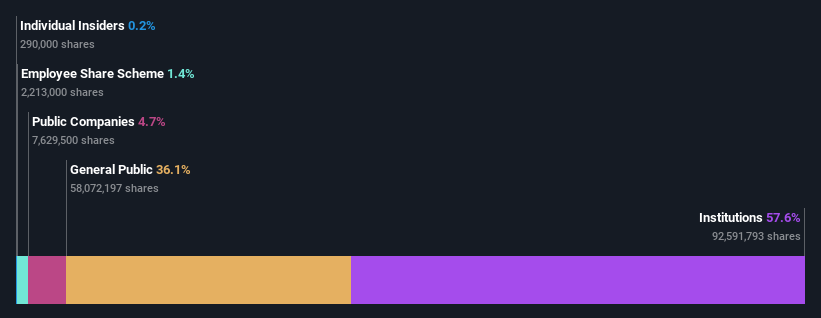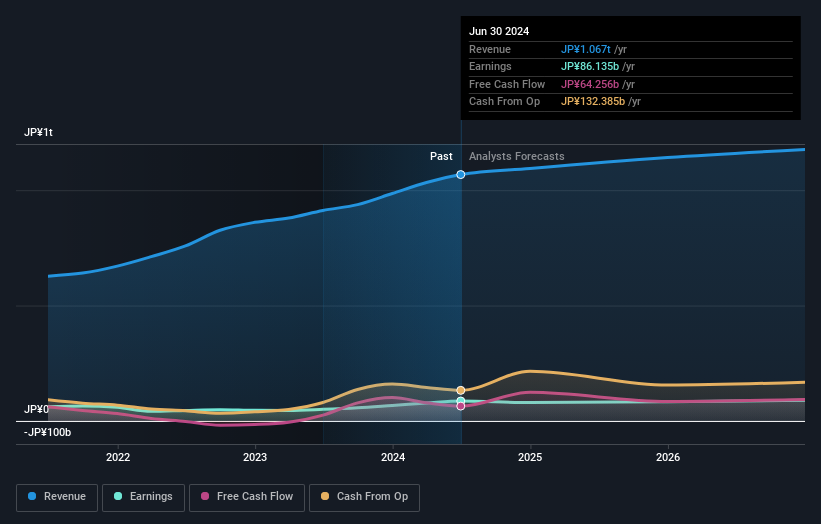- Japan
- /
- Auto Components
- /
- TSE:5101
Institutional owners may ignore The Yokohama Rubber Company, Limited's (TSE:5101) recent JP¥17b market cap decline as longer-term profits stay in the green

Key Insights
- Significantly high institutional ownership implies Yokohama Rubber Company's stock price is sensitive to their trading actions
- 51% of the business is held by the top 11 shareholders
- Ownership research along with analyst forecasts data help provide a good understanding of opportunities in a stock
A look at the shareholders of The Yokohama Rubber Company, Limited (TSE:5101) can tell us which group is most powerful. We can see that institutions own the lion's share in the company with 58% ownership. That is, the group stands to benefit the most if the stock rises (or lose the most if there is a downturn).
Institutional investors was the group most impacted after the company's market cap fell to JP¥522b last week. However, the 14% one-year return to shareholders might have softened the blow. They should, however, be mindful of further losses in the future.
Let's delve deeper into each type of owner of Yokohama Rubber Company, beginning with the chart below.
See our latest analysis for Yokohama Rubber Company

What Does The Institutional Ownership Tell Us About Yokohama Rubber Company?
Many institutions measure their performance against an index that approximates the local market. So they usually pay more attention to companies that are included in major indices.
We can see that Yokohama Rubber Company does have institutional investors; and they hold a good portion of the company's stock. This can indicate that the company has a certain degree of credibility in the investment community. However, it is best to be wary of relying on the supposed validation that comes with institutional investors. They too, get it wrong sometimes. It is not uncommon to see a big share price drop if two large institutional investors try to sell out of a stock at the same time. So it is worth checking the past earnings trajectory of Yokohama Rubber Company, (below). Of course, keep in mind that there are other factors to consider, too.

Institutional investors own over 50% of the company, so together than can probably strongly influence board decisions. Hedge funds don't have many shares in Yokohama Rubber Company. The company's largest shareholder is Nomura Asset Management Co., Ltd., with ownership of 12%. Meanwhile, the second and third largest shareholders, hold 6.8% and 6.3%, of the shares outstanding, respectively.
A closer look at our ownership figures suggests that the top 11 shareholders have a combined ownership of 51% implying that no single shareholder has a majority.
While it makes sense to study institutional ownership data for a company, it also makes sense to study analyst sentiments to know which way the wind is blowing. Quite a few analysts cover the stock, so you could look into forecast growth quite easily.
Insider Ownership Of Yokohama Rubber Company
While the precise definition of an insider can be subjective, almost everyone considers board members to be insiders. The company management answer to the board and the latter should represent the interests of shareholders. Notably, sometimes top-level managers are on the board themselves.
I generally consider insider ownership to be a good thing. However, on some occasions it makes it more difficult for other shareholders to hold the board accountable for decisions.
Our data suggests that insiders own under 1% of The Yokohama Rubber Company, Limited in their own names. It's a big company, so even a small proportional interest can create alignment between the board and shareholders. In this case insiders own JP¥941m worth of shares. It is always good to see at least some insider ownership, but it might be worth checking if those insiders have been selling.
General Public Ownership
With a 36% ownership, the general public, mostly comprising of individual investors, have some degree of sway over Yokohama Rubber Company. This size of ownership, while considerable, may not be enough to change company policy if the decision is not in sync with other large shareholders.
Public Company Ownership
We can see that public companies hold 4.7% of the Yokohama Rubber Company shares on issue. It's hard to say for sure but this suggests they have entwined business interests. This might be a strategic stake, so it's worth watching this space for changes in ownership.
Next Steps:
It's always worth thinking about the different groups who own shares in a company. But to understand Yokohama Rubber Company better, we need to consider many other factors. Be aware that Yokohama Rubber Company is showing 1 warning sign in our investment analysis , you should know about...
If you would prefer discover what analysts are predicting in terms of future growth, do not miss this free report on analyst forecasts.
NB: Figures in this article are calculated using data from the last twelve months, which refer to the 12-month period ending on the last date of the month the financial statement is dated. This may not be consistent with full year annual report figures.
New: Manage All Your Stock Portfolios in One Place
We've created the ultimate portfolio companion for stock investors, and it's free.
• Connect an unlimited number of Portfolios and see your total in one currency
• Be alerted to new Warning Signs or Risks via email or mobile
• Track the Fair Value of your stocks
Have feedback on this article? Concerned about the content? Get in touch with us directly. Alternatively, email editorial-team (at) simplywallst.com.
This article by Simply Wall St is general in nature. We provide commentary based on historical data and analyst forecasts only using an unbiased methodology and our articles are not intended to be financial advice. It does not constitute a recommendation to buy or sell any stock, and does not take account of your objectives, or your financial situation. We aim to bring you long-term focused analysis driven by fundamental data. Note that our analysis may not factor in the latest price-sensitive company announcements or qualitative material. Simply Wall St has no position in any stocks mentioned.
About TSE:5101
Yokohama Rubber Company
Manufactures and sells tires in Japan, the United States, India, China, the Philippines, and internationally.
Very undervalued with solid track record and pays a dividend.


